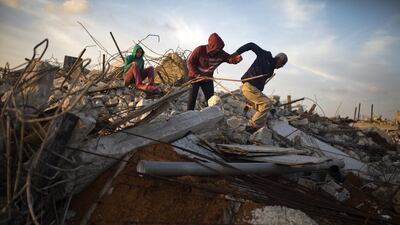QALANSUWA, ISRAEL // Leaders of Israel’s Arab minority are planning further protests to discourage prime minister Benjamin Netanyahu’s government from widening a crackdown on illegally built houses that started with a devastating demolition operation last week.
Arab leaders and citizens consider the demolitions cruel and unwarranted, arguing that discriminatory government planning policies preclude Arabs from getting building permits, forcing them to build illegally on their own land.
On Friday, thousands turned out to protest against the bulldozing of 11 buildings in the Arab town of Qalansuwa in central Israel three days earlier. It was one of the largest demolition operations in Arab areas in recent years, carried out with hundreds of police in attendance.
“Destruction of houses equals destruction of dignity” read signs in the crowd that gathered amid the debris.
Yousef Jabareen, an Arab member of Israel’s parliament, the Knesset, said the demonstration “sends a clear message to Netanyahu and the ministers that our community will not sit aside when they are planning more demolitions”.
“As a marginalised and discriminated-against community,” he said, “our power is with the masses coming out and protesting and I hope this will be a beginning for more plans, including a demonstration in Jerusalem.”
The demolitions came nearly a month after Mr Netanyahu was quoted in media reports as calling for increased demolitions of illegal buildings in Arab towns, apparently to counterbalance the expected demolition of the illegal Amona settlement outpost in the occupied West Bank.
Mr Netanyahu wrote on Facebook after the demolitions: “I am not deterred by the criticism and as I have directed we are continuing to implement equal enforcement in Israel.”
Israel’s finance ministry said the structures had been destroyed because they were built without permits on agricultural land outside the planning zone for building. They were in various stages of construction and all were unoccupied, it said.
But Youssef Makhlouf, 58, said he and his family had been living in one of the demolished houses, which he said had been completed two years ago.
“I have nothing left. They have left me without anything,” said Mr Makhlouf, who worked as a builder of swimming pools until he was forced to stop because of a heart condition.
“They have destroyed my children. They have destroyed me.”
He said that a demolition notice was posted on the house late on Monday and the bulldozers came early the next day, leaving him no time to petition for court intervention to spare the house.
“All my life I worked to make that house,” he said. “All my life. There’s nothing left.”
The mayor of Qalansuwa, Abdul-Basat Salameh said some of the other demolished homes had also been inhabited.
The demolitions have added a new layer of bitterness to the acrimonious relations between Arab citizens and the Netanyahu government.
Demonstrators said there was no comparison between illegal Arab building and the Amona settlement outpost, stressing that the Arab citizens had built on their own land, while the Amona construction was carried out on the private property of Palestinians.
“It’s a racist policy not to give permits to Arabs,” said Rashid Baransi, an electrician from the nearby town of Taibe.
“In Amona they stole [someone’s land] and got a million shekels each in compensation. Here, we have people who invested their souls and they demolish their homes. It is the politics of Netanyahu to pour his hatred on to innocent Arabs.”
Right-wing Israeli legislator Bezalel Smotrich praised the demolitions and said they did not go far enough. “The actions that were taken are positive, but they are not even a drop in the ocean,” he said. “Construction violations in the Arab sector are like a disease and show a blatant disregard for the law.”
Uri Avnery, head of the dovish Israeli group Gush Shalom, termed the demolitions “atrocious”.
“This is purely politically motivated,” he said. “The government wants to show its ultra-right supporters it is doing something against Arabs.”
About 600 houses in Qalansuwa have been built without permits, according to Thabet Abu Rass, chief executive of Abraham Fund Initiatives, an NGO that seeks to promote equality. The total number of illegally-built homes in Arab areas is about 55,000, he said.
Arab leaders say that because of discriminatory policies, there is insufficient government planning for Arab areas that would enable the granting of permits to meet the demand for home construction. In Qalansuwa, the municipality’s bid for government approval of a detailed plan that would allow for more building has been held up for 14 years. The town’s population has doubled in that period.
“It’s bureaucracy that simply doesn’t move,” said town councillor Issam Taya. “We are citizens who just want to build on our land.”
He said the demolitions left house owners financially devastated. “It’s not just that their money is gone, we are talking about people in debt. They are left without a house, without money and in debt. And then the state demands that they pay for the cost of the demolition.”
foreign.desk@thenational.ae

